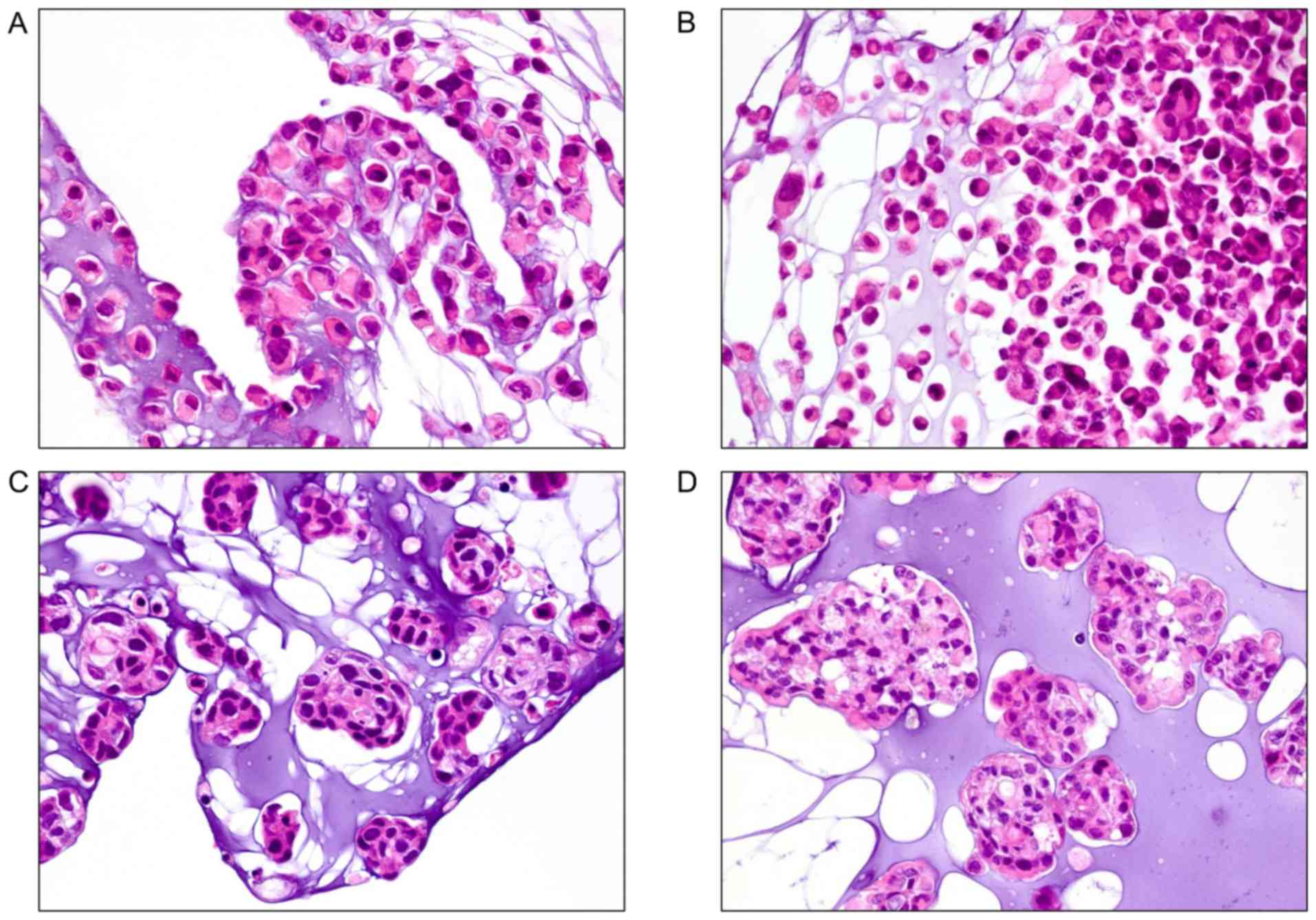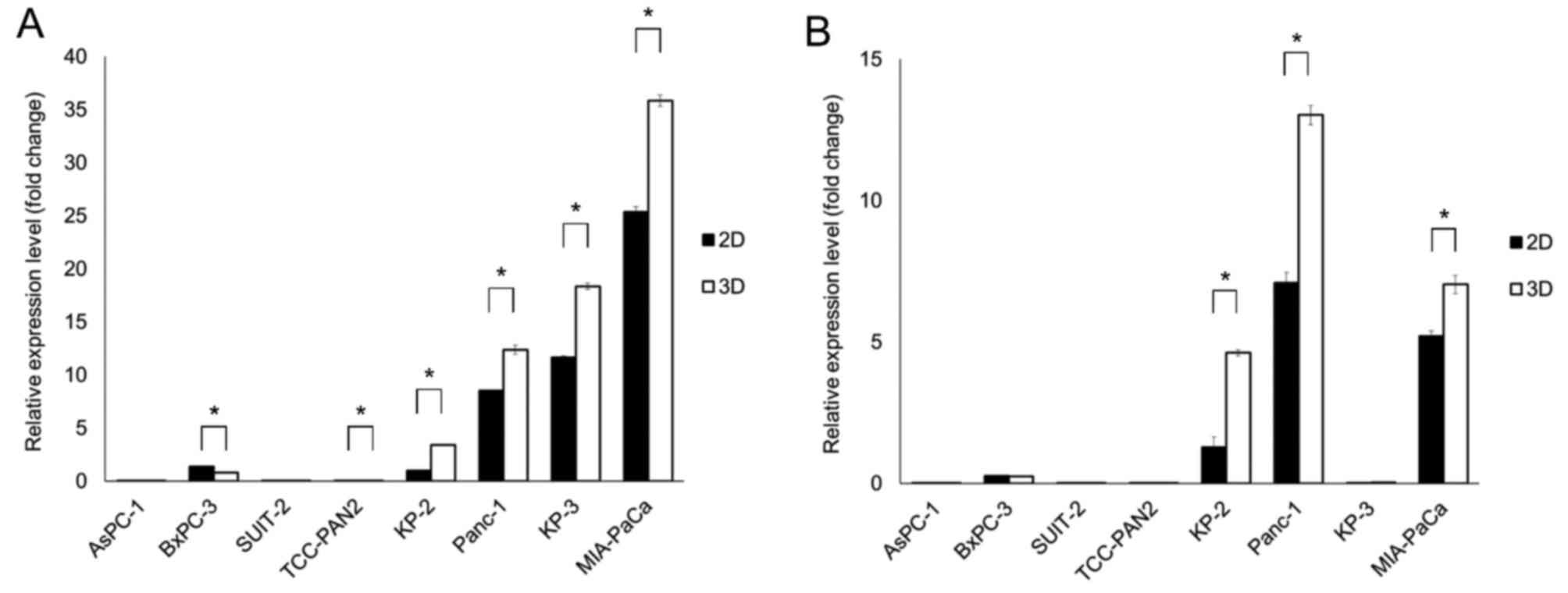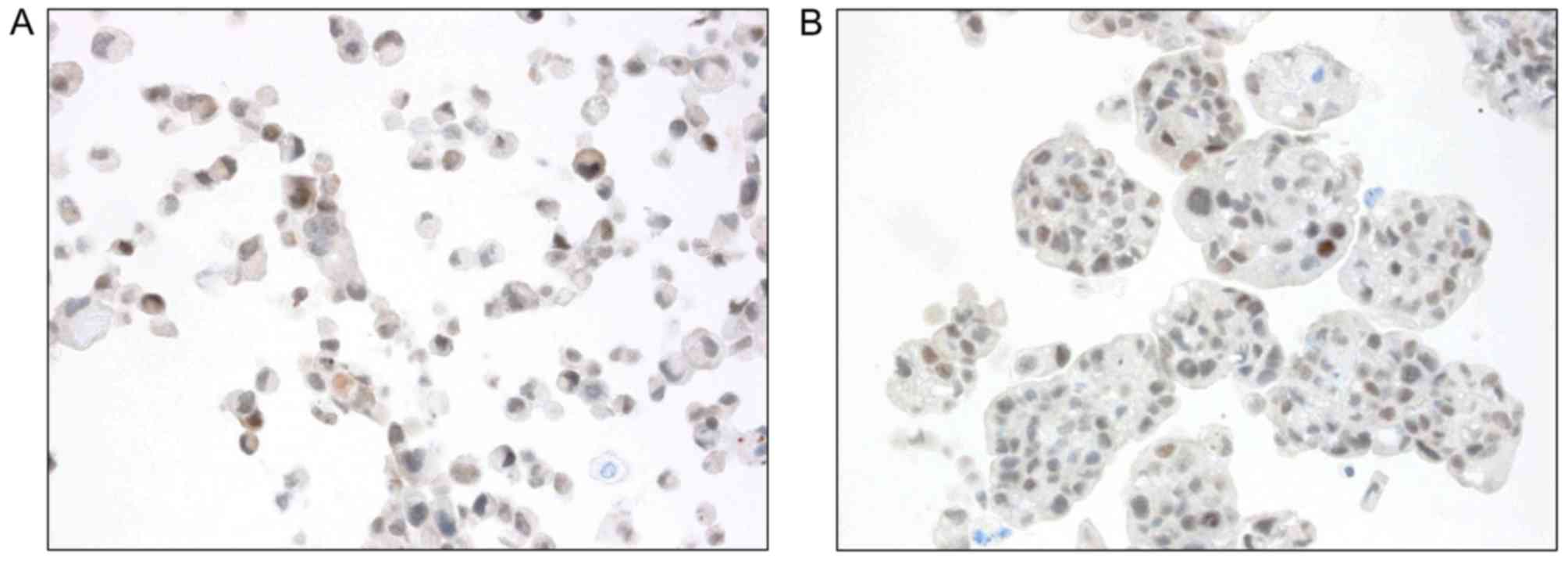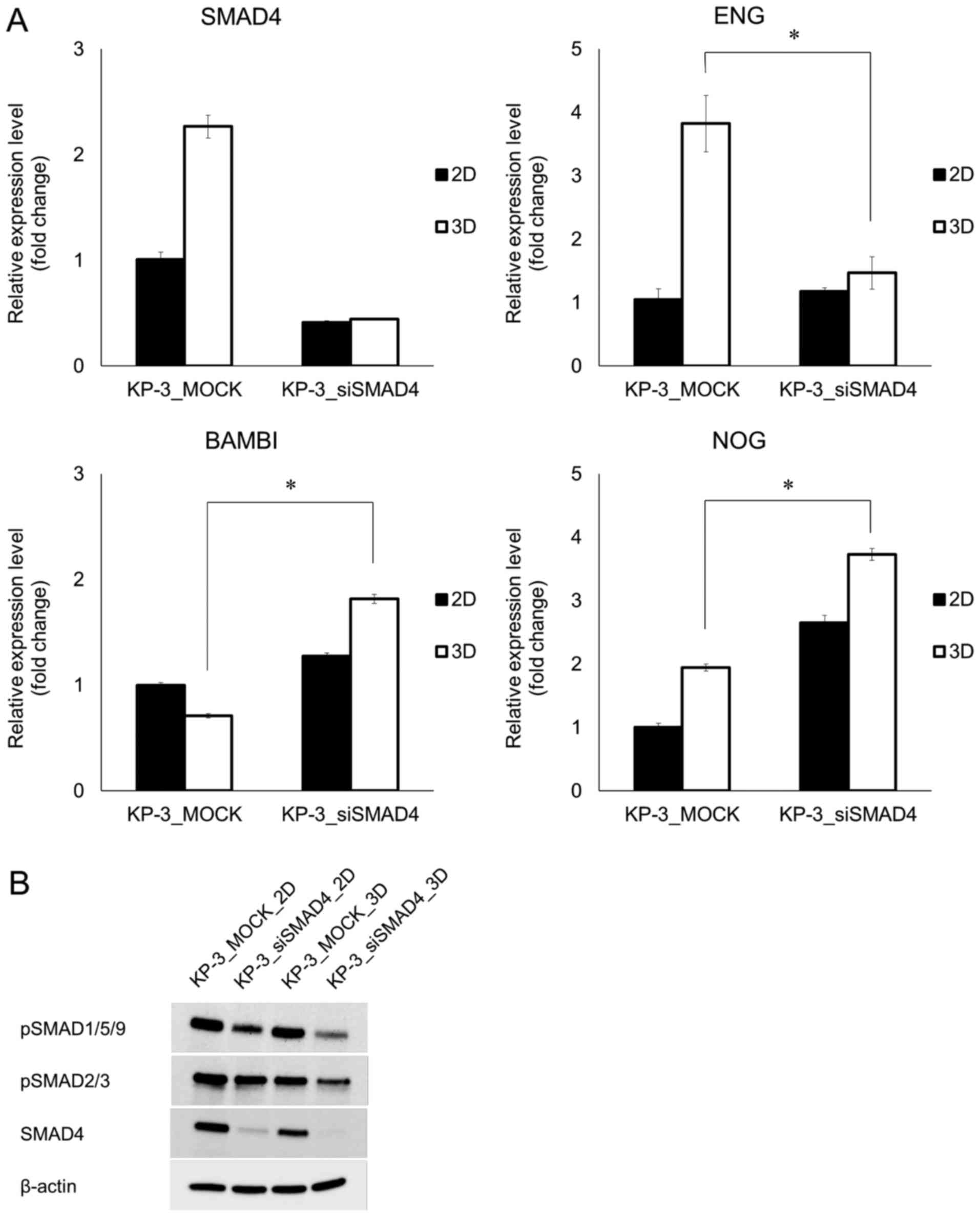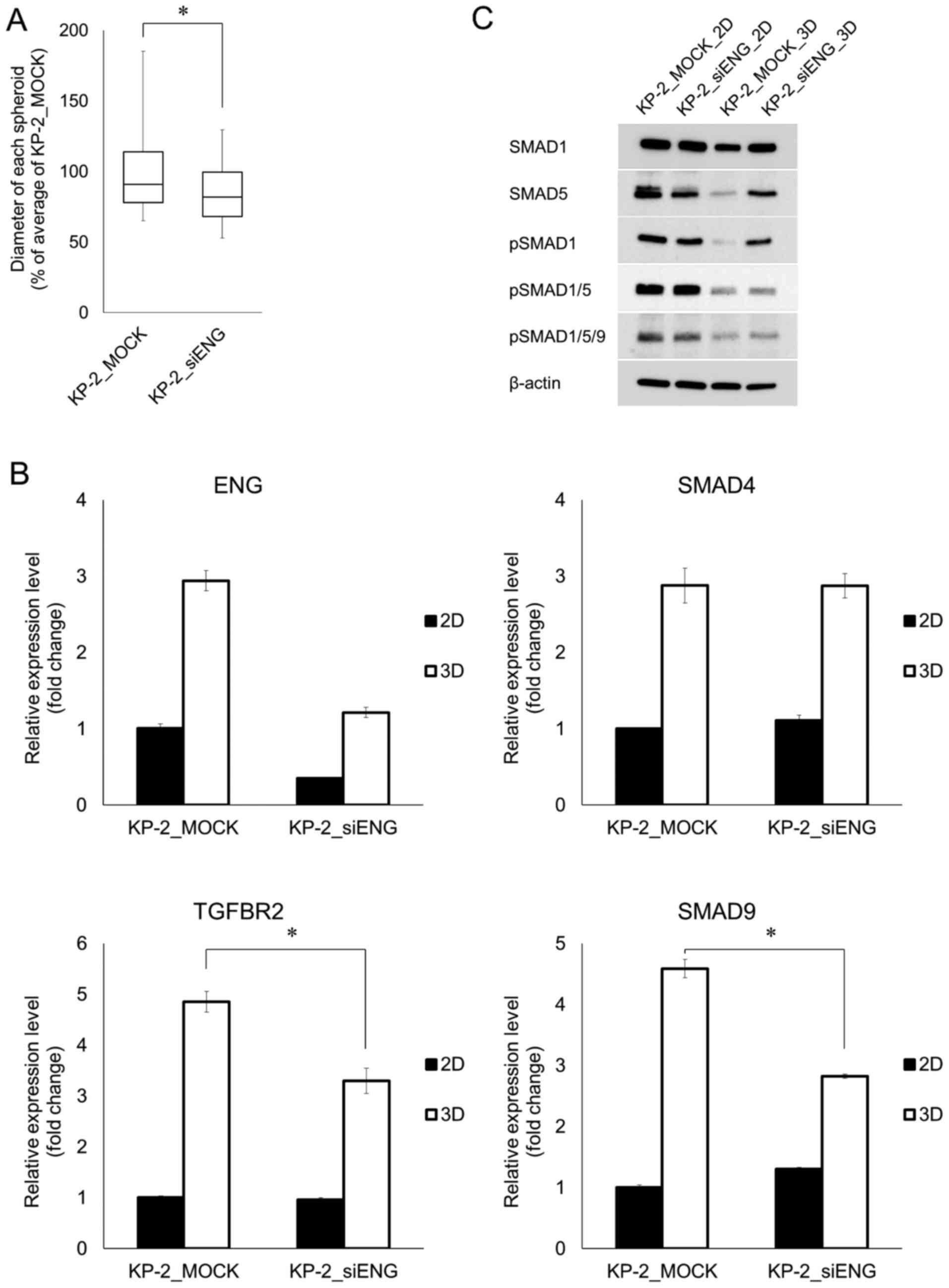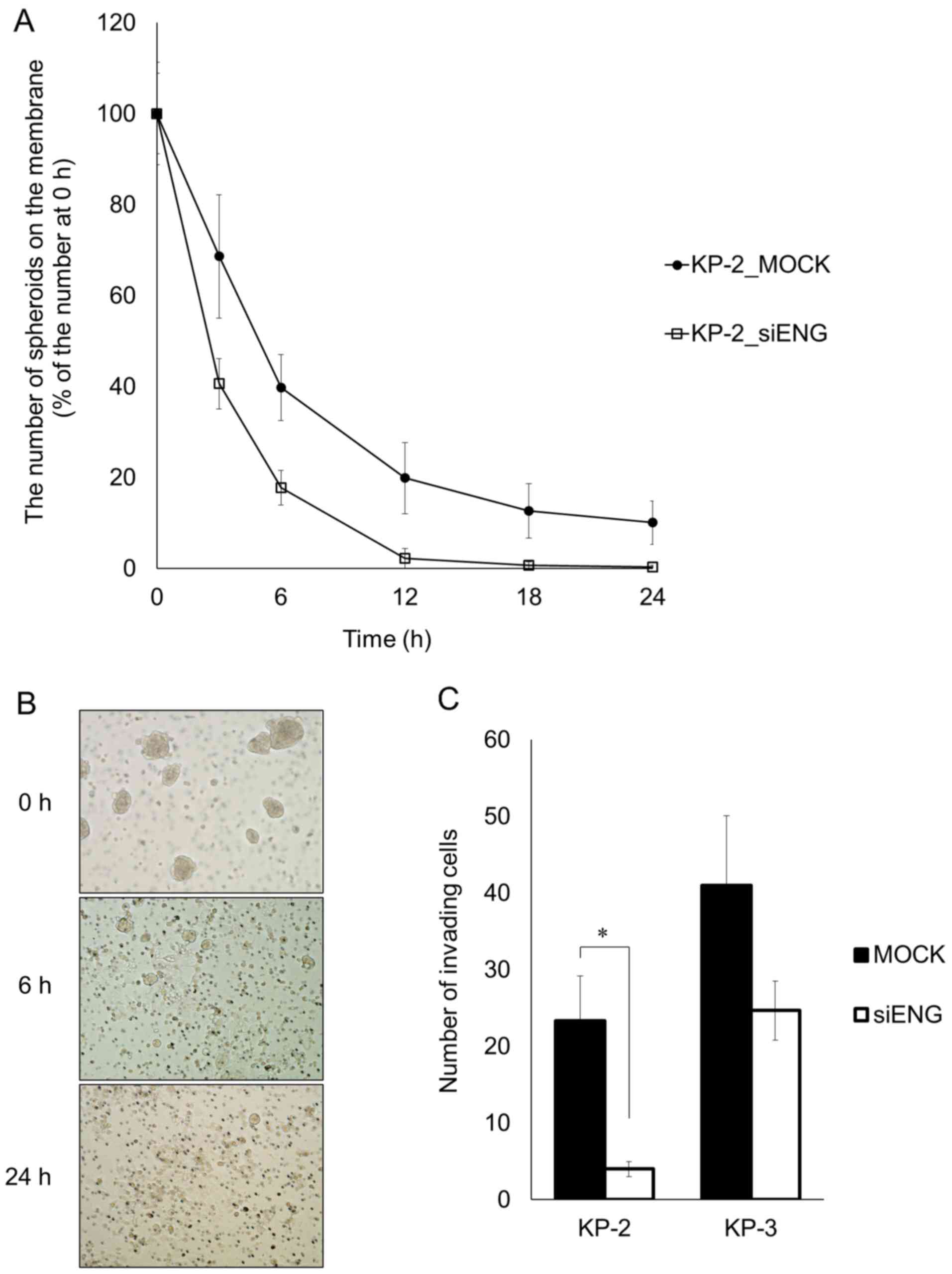|
1
|
Siegel RL, Miller KD and Jemal A: Cancer
Statistics, 2017. CA Cancer J Clin. 67:7–30. 2017. View Article : Google Scholar : PubMed/NCBI
|
|
2
|
Stathis A and Moore MJ: Advanced
pancreatic carcinoma: Current treatment and future challenges. Nat
Rev Clin Oncol. 7:163–172. 2010. View Article : Google Scholar : PubMed/NCBI
|
|
3
|
Hruban RH, Pitman MB and Klimstra DS:
Tumors of the Pancreas. Atlas of Tumor Pathology. (4th series
edition). pp. 6Washington DC: 2007
|
|
4
|
Hruban RH, Takaori K, Klimstra DS, Adsay
NV, Albores-Saavedra J, Biankin AV, Biankin SA, Compton C,
Fukushima N, Furukawa T, et al: An illustrated consensus on the
classification of pancreatic intraepithelial neoplasia and
intraductal papillary mucinous neoplasms. Am J Surg Pathol.
28:977–987. 2004. View Article : Google Scholar : PubMed/NCBI
|
|
5
|
Jones S, Zhang X, Parsons DW, Lin JC,
Leary RJ, Angenendt P, Mankoo P, Carter H, Kamiyama H, Jimeno A, et
al: Core signaling pathways in human pancreatic cancers revealed by
global genomic analyses. Science. 321:1801–1806. 2008. View Article : Google Scholar : PubMed/NCBI
|
|
6
|
Waddell N, Pajic M, Patch AM, Chang DK,
Kassahn KS, Bailey P, Johns AL, Miller D, Nones K, Quek K, et al
Australian Pancreatic Cancer Genome Initiative: Whole genomes
redefine the mutational landscape of pancreatic cancer. Nature.
518:495–501. 2015. View Article : Google Scholar : PubMed/NCBI
|
|
7
|
Almoguera C, Shibata D, Forrester K,
Martin J, Arnheim N and Perucho M: Most human carcinomas of the
exocrine pancreas contain mutant c-K-ras genes. Cell. 53:549–554.
1988. View Article : Google Scholar : PubMed/NCBI
|
|
8
|
Caldas C, Hahn SA, da Costa LT, Redston
MS, Schutte M, Seymour AB, Weinstein CL, Hruban RH, Yeo CJ and Kern
SE: Frequent somatic mutations and homozygous deletions of the p16
(MTS1) gene in pancreatic adenocarcinoma. Nat Genet. 8:27–32. 1994.
View Article : Google Scholar : PubMed/NCBI
|
|
9
|
Redston MS, Caldas C, Seymour AB, Hruban
RH, da Costa L, Yeo CJ and Kern SE: p53 mutations in pancreatic
carcinoma and evidence of common involvement of homocopolymer
tracts in DNA microdeletions. Cancer Res. 54:3025–3033.
1994.PubMed/NCBI
|
|
10
|
Hahn SA, Schutte M, Hoque AT, Moskaluk CA,
da Costa LT, Rozenblum E, Weinstein CL, Fischer A, Yeo CJ, Hruban
RH, et al: DPC4, a candidate tumor suppressor gene at human
chromosome 18q21.1. Science. 271:350–353. 1996. View Article : Google Scholar : PubMed/NCBI
|
|
11
|
Lagna G, Hata A, Hemmati-Brivanlou A and
Massagué J: Partnership between DPC4 and SMAD proteins in TGF-beta
signalling pathways. Nature. 383:832–836. 1996. View Article : Google Scholar : PubMed/NCBI
|
|
12
|
Blackford A, Serrano OK, Wolfgang CL,
Parmigiani G, Jones S, Zhang X, Parsons DW, Lin JC, Leary RJ,
Eshleman JR, et al: SMAD4 gene mutations are associated with poor
prognosis in pancreatic cancer. Clin Cancer Res. 15:4674–4679.
2009. View Article : Google Scholar : PubMed/NCBI
|
|
13
|
Massagué J: TGFbeta in Cancer. Cell.
134:215–230. 2008. View Article : Google Scholar : PubMed/NCBI
|
|
14
|
Nassiri F, Cusimano MD, Scheithauer BW,
Rotondo F, Fazio A, Yousef GM, Syro LV, Kovacs K and Lloyd RV:
Endoglin (CD105): A review of its role in angiogenesis and tumor
diagnosis, progression and therapy. Anticancer Res. 31:2283–2290.
2011.PubMed/NCBI
|
|
15
|
Gromova P, Rubin BP, Thys A, Cullus P,
Erneux C and Vanderwinden JM: ENDOGLIN/CD105 is expressed in KIT
positive cells in the gut and in gastrointestinal stromal tumours.
J Cell Mol Med. 16:306–317. 2012. View Article : Google Scholar
|
|
16
|
Davidson B, Stavnes HT, Førsund M, Berner
A and Staff AC: CD105 (Endoglin) expression in breast carcinoma
effusions is a marker of poor survival. Breast. 19:493–498. 2010.
View Article : Google Scholar : PubMed/NCBI
|
|
17
|
Ziebarth AJ, Nowsheen S, Steg AD, Shah MM,
Katre AA, Dobbin ZC, Han HD, Lopez-Berestein G, Sood AK, Conner M,
et al: Endoglin (CD105) contributes to platinum resistance and is a
target for tumor-specific therapy in epithelial ovarian cancer.
Clin Cancer Res. 19:170–182. 2013. View Article : Google Scholar :
|
|
18
|
Fujiwara K, Ohuchida K, Ohtsuka T,
Mizumoto K, Shindo K, Ikenaga N, Cui L, Takahata S, Aishima S and
Tanaka M: Migratory activity of CD105+ pancreatic cancer
cells is strongly enhanced by pancreatic stellate cells. Pancreas.
42:1283–1290. 2013. View Article : Google Scholar : PubMed/NCBI
|
|
19
|
Pal K, Pletnev AA, Dutta SK, Wang E, Zhao
R, Baral A, Yadav VK, Aggarwal S, Krishnaswamy S, Alkharfy KM, et
al: Inhibition of endoglin-GIPC interaction inhibits pancreatic
cancer cell growth. Mol Cancer Ther. 13:2264–2275. 2014. View Article : Google Scholar : PubMed/NCBI
|
|
20
|
Livak KJ and Schmittgen TD: Analysis of
relative gene expression data using real-time quantitative PCR and
the 2(−Delta Delta C(T)) method. Methods. 25:402–408. 2001.
View Article : Google Scholar
|
|
21
|
Ke Z, Zhang X, Ma L and Wang L: Deleted in
pancreatic carcinoma locus 4/Smad4 participates in the regulation
of apoptosis by affecting the Bcl-2/Bax balance in non-small cell
lung cancer. Hum Pathol. 39:1438–1445. 2008. View Article : Google Scholar : PubMed/NCBI
|
|
22
|
Xu Y, Wang D, Zhao LM, Zhao XL, Shen JJ,
Xie Y, Cao LL, Chen ZB, Luo YM, Bao BH, et al: Endoglin is
necessary for angiogenesis in human ovarian carcinoma-derived
primary endothelial cells. Cancer Biol Ther. 14:937–948. 2013.
View Article : Google Scholar : PubMed/NCBI
|
|
23
|
Ishiguro T, Ohata H, Sato A, Yamawaki K,
Enomoto T and Okamoto K: Tumor-derived spheroids: Relevance to
cancer stem cells and clinical applications. Cancer Sci.
108:283–289. 2017. View Article : Google Scholar : PubMed/NCBI
|
|
24
|
Forcet C and Billaud M: Dialogue between
LKB1 and AMPK: A hot topic at the cellular pole. Sci STKE.
2007.pe512007.PubMed/NCBI
|
|
25
|
Groppe J, Greenwald J, Wiater E,
Rodriguez-Leon J, Economides AN, Kwiatkowski W, Affolter M, Vale
WW, Izpisua Belmonte JC and Choe S: Structural basis of BMP
signalling inhibition by the cystine knot protein Noggin. Nature.
420:636–642. 2002. View Article : Google Scholar : PubMed/NCBI
|
|
26
|
Onichtchouk D, Chen YG, Dosch R, Gawantka
V, Delius H, Massagué J and Niehrs C: Silencing of TGF-beta
signalling by the pseudoreceptor BAMBI. Nature. 401:480–485. 1999.
View Article : Google Scholar : PubMed/NCBI
|
|
27
|
Hawinkels LJ, Kuiper P, Wiercinska E,
Verspaget HW, Liu Z, Pardali E, Sier CF and ten Dijke P: Matrix
metalloproteinase-14 (MT1-MMP)-mediated endoglin shedding inhibits
tumor angiogenesis. Cancer Res. 70:4141–4150. 2010. View Article : Google Scholar : PubMed/NCBI
|
|
28
|
Takahashi N, Kawanishi-Tabata R, Haba A,
Tabata M, Haruta Y, Tsai H and Seon BK: Association of serum
endoglin with metastasis in patients with colorectal, breast, and
other solid tumors, and suppressive effect of chemotherapy on the
serum endoglin. Clin Cancer Res. 7:524–532. 2001.PubMed/NCBI
|















